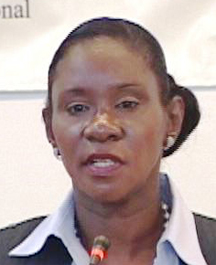Ending the cycle of domestic violence and abuse continues to be a priority issue, according to Minister of Human Services Jennifer Webster, who says more steps are being considered to augment the ministry’s current programme.
She made this disclosure in her address at a Women and Gender Equality Com-mission forum on Monday. Representatives from the Rights of the Child Commis-sion, Indigenous People’s Commission, Chambers of the Director of Public Prose-cution, Women’s Pro-gressive Organisation, National Con-gress of Women, the judicial system, Help and Shelter, Guyana Police Force and the Guyana Legal Aid Clinic shared snippets of case studies and the challenges they experience in their respective agencies at the forum, which was held in observance of International Women’s Day 2012.
Under the theme “Access to Justice for Women,” some of the issues that were highlighted are the need for networking and the sharing of inter-sectoral information, jury duty, the need for counsellors in the judicial system, gender sensitivity, improved reporting procedures, investigations, and addressing victims/survivors’ needs.

A Government Informa-tion Agency (GINA) report said the justice system was the focal point of discussions as it resonates in the society where cases of abuse, which is sometimes the result of injustice, is frequent featured in the daily newspapers and news broadcasts.
Webster reiterated that abuse of women should not be condoned in any form even as she explained that the Beijing Platform for Action reaffirms that all human rights—civil, economic, cultural, and political, development and social—are universal, indivisible, inter-dependent and are interrelated. The minister also acknowledged that though several laws have been enacted, including the Domestic Violence and the new Sexual Offences Act, the presentations indicate that there are some systemic weaknesses that are hampering implementation. Never-theless, the ministry remains committed to working with all stakeholders to realize solutions to these challenges.
In this respect, Webster said she is determined to change the current situation as she believes that no woman should be denied justice. She noted that domestic violence is the public’s business and based on the case studies presented, most victims do not access the justice system and those who do had already experienced varying levels of abuse before taking any action. In this regard, she listed several measures that can be taken, such as mandating hospitals to report domestic violence cases, creating a unit within the Guyana Police Force to conduct detailed investigations into the complaints, establishing family counselling centres throughout the country, and increasing support to domestic violence victims.
Webster also said that an organ can be created to allow victims who encounter problems making police reports and with the justice system to lodge complaints. Systems can also be put in place to allow magistrates to access criminal records of the applicants and respondents, to educate stakeholders on the Sexual Offences Act and the regulations that will soon be enacted and reduce the timeframe when such cases are heard in the judicial system.
According to GINA, currently, the ministry is considering establishing a domestic violence and sexual offences unit to boost its current programme and provide more support in addressing existing social issues.
Chairperson of the Women and Gender Equality Com-mission Indra Chandarpal explained that when the commission was formed, a decision was taken to host a stakeholder session annually and Monday’s forum was the second annual session. The objective of the forum was to educate stakeholders about what action must be taken when addressing issues affecting women and children.
Chandarpal highlighted the organisation’s functions, particularly its duties to recommend and promote the implementation of legislation and the formation of policies and measures to enhance and protect women, and to promote, initiate or cause to be carried out research and the creation of databases on women and gender issues.
Deputy Chairperson of the Commission Cheryl Sampson noted that this month is dedicated to recognising women’s social, economic and political accomplishments. She noted that International Women’s Day is tremendously important, since it highlights gender inequalities of the past, brings into focus current gender issues of today and sets the agenda and momentum for the future.




